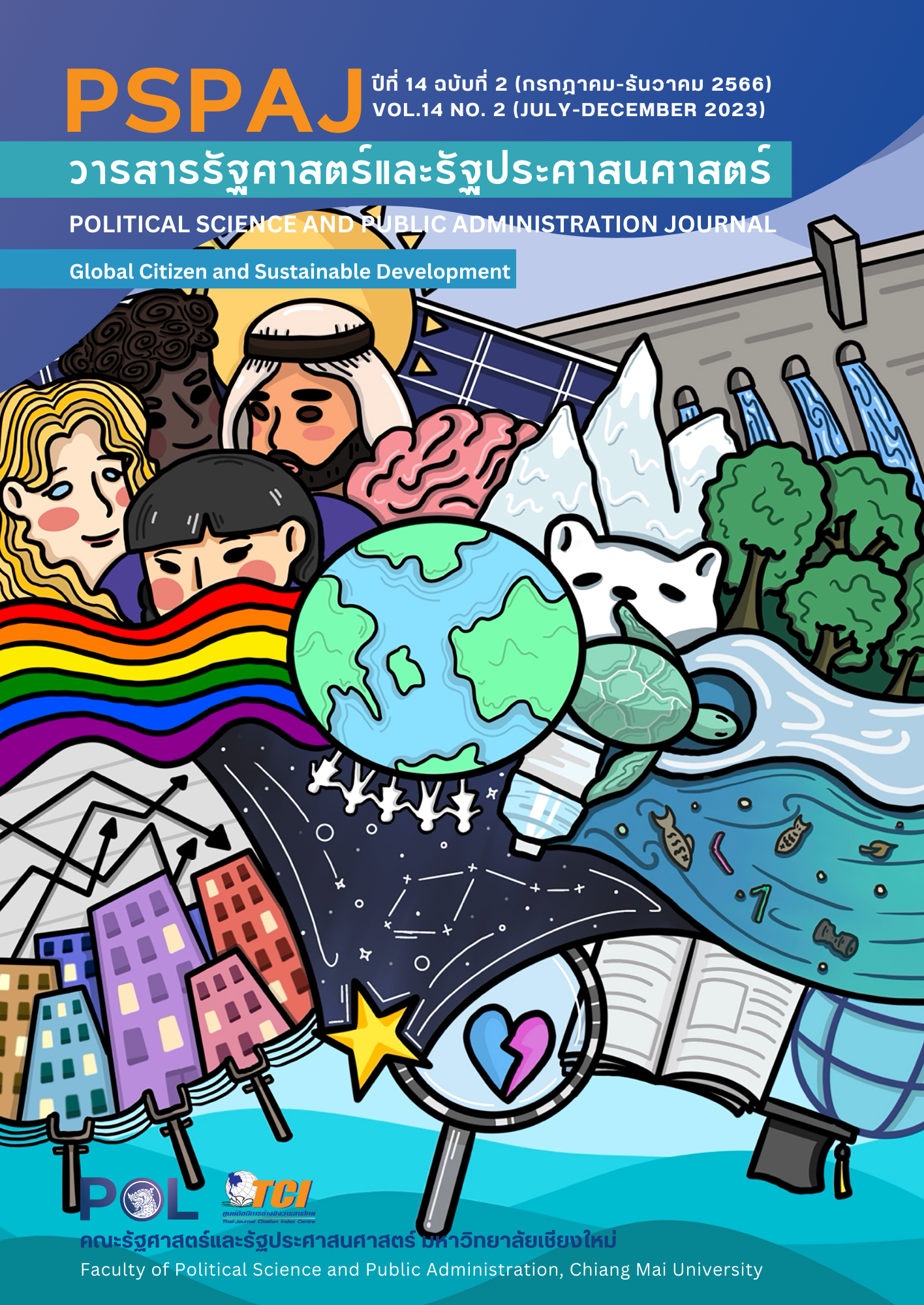The Roles of Smart Governance in Promoting the Citizenship in Japan
Main Article Content
Abstract
The concept of smart cities pertains to the management of urban communities as pursued by the Sustainable Development Goals (SDGs), with a particular focus on the development of sustainable cities and communities. Japan is among the countries that have experienced the challenges of urbanization and have consequently embraced the idea of smart cities as a means to tackle the associated urban issues. The utilization of smart cities initially revolved around energy management but has since expanded to encompass the resolution of social issues, with a particular emphasis on the welfare of residents. This article aims to describe the role of smart cities in promoting citizenship through an examination of the smart governance dimension, which emphasizes public participation and collaboration between the government and private sector. The author employs a case study centered on Japan to clarify the issue and discovers that Japan's smart city policy encompasses not only governmental or municipal entities but also emphasizes the participation of both the private and public sectors. The Japanese municipalities prioritize the principles of participation, partnership, collaboration, and communication, which encompass the fundamental components of smart government. The application of smart governance to the political administration in Japan enhances the effectiveness of public administration, fosters an improved quality of life for people and strengthens citizenship. This approach is expected to result in the attainment of the highest level of sustainable economic development.
Downloads
Article Details

This work is licensed under a Creative Commons Attribution-NonCommercial-NoDerivatives 4.0 International License.
- เนื้อหาและข้อมูลที่ลงตีพิมพ์ในวารสารรัฐศาสตร์และรัฐประศาสนศาสตร์ถือเป็นข้อคิดเห็นและความรับผิดชอบของผู้เขียนบทความโดยตรง ซึ่งกองบรรณาธิการวารสารรัฐศาสตร์และรัฐประศาสนศาสตร์ ไม่จำเป็นต้องเห็นด้วย หรือร่วมรับผิดชอบใดๆ
- บทความและข้อมูล ที่ได้รับการตีพิมพ์ในวารสารรัฐศาสตร์และรัฐประศาสนศาสตร์ ถือเป็นลิขสิทธิ์ของวารสาร หากบุคคลหรือหน่วยงานใดต้องการนำข้อมูลไปใช้ประโยชน์ในทางวิชาการ ขอให้อ้างอิงแหล่งที่มาด้วย
References
Accenture. (n.d.). Accenture Innovation Center Fukushima. Retrieved September 9, 2023, from https://www.accenture.com/jp-ja/about/accenture-innovation-center-fukushima-en
Barrett, B. F. D., DeWit, A., & Yarime, M. (2021). Chapter 5 - Japanese Smart Cities and Communities: Integrating Technological and Institutional Innovation for Society 5.0. In Kim, H. M., Sabri, S., & Kent, A. (Eds.). Smart Cities for Technological and Social Innovation (pp. 73–94). London, UK: Academic Press.
Blasi, S., Ganzaroli, A., & De Noni, I. (2022). Smartening Sustainable Development in Cities: Strengthening the Theoretical Linkage between Smart Cities and SDGs. Sustainable Cities and Society, 80, 103793. doi: 10.1016/j.scs.2022.103793.
Capdevila, I., & Zarlenga, M. I. (2015). Smart City or Smart Citizens? The Barcelona Case. Journal of Strategy and Management, 8(3), 266-282. doi: 10.1108/JSMA-03-2015-0030.
Chourabi, H., Nam, T., Walker, S., Gil-Garcia, J. R., Mellouli, S., Nahon, K., & et al. (2012). Understanding Smart Cities: An Integrative Framework. In Proceedings of the 45th Annual Hawaii International Conference on System Sciences, HICSS-45 (pp. 2289-2297). https://doi.org/10.1109/HICSS.2012.615
City of Yokohama. (n.d.). Yokohama Smart City Project. Retrieved September 11, 2023, from https://www.city.yokohama.lg.jp/kurashi/machizukuri-kankyo/ondanka/etc/yscp/yscp01.html
De Guimarães, J. C., Severo, E. A., Júnior, L. A., Costa, W. P., & Salmoria, F. T. (2020). Governance and Quality of Life in Smart Cities: Towards Sustainable Development Goals. Journal of Cleaner Production, 253, 119926. doi: 10.1016/j.jclepro.2019.119926.
Deguchi, A. (2020). From Smart City to Society 5.0. In Society 5.0: A People-centric Super-smart Society (pp. 43-65). Tokyo: Springer.
ESCAP. (n.d.). Demographic Changes Japan. Retrieved September 8, 2023, from https://www.population-trends-asiapacific.org/data/JPN
Fernández-Añez, V., Fernández-Güell, J. M., & Giffinger, R. (2017). Smart City Implementation and Discourses: An Integrated Conceptual Model. The Case of Vienna. Cities, 78, 4-16. doi: 10.1016/j.cities.2017.12.004.
Gao, W., Fan, L., Ushifusa, Y., Gu, Q., & Ren, J. (2016). Possibility and Challenge of Smart Community in Japan. Procedia - Social and Behavioral Sciences, 216, 109-118. doi: 10.1016/j.sbspro.2015.12.015.
Giffinger, R., Haindlmaier, G., & Kramar, H. (2010). The Role of Rankings in Growing City Competition. Urban Research & Practice, 3(3), 299-312. doi: 10.1080/17535069.2010.524420.
Harrison, T. M., Guerrero, S., Burke, G. B., Cook, M. E., Cresswell, A. M., Helbig, N., Hrdinová, J., & Pardo, T. A. (2012). Open Government and E-Government: Democratic Challenges from a Public Value Perspective. Information Polity, 17(2), 83-97. doi: 10.3233/IP-2012-0269.
Lee, J. H., Hancock, M. G., & Hu, M. (2014). Towards an Effective Framework for Building Smart Cities: Lessons from Seoul and San Francisco. Technological Forecasting and Social Change, 89, 80-99. doi: 10.1016/j.techfore.2013.08.033.
Lin, C., Zhao, G., Yu, C., & Wu, Y. J. (2019). Smart City Development and Residents’ Well-Being. Sustainability, 11(3), 676. doi: 10.3390/su11030676.
Line Smart City for Fukuoka. (n.d.). Line Smart City for Fukuoka. Retrieved September 11, 2023, from https://smartcity.linefukuoka.co.jp/ja/project/smartcityproject/service
Meijer, A. (2016). Smart City Governance: A Local Emergent Perspective. In Gil-García J. R., Pardo T. A., & Nam T. (Eds.). Smarter as the New Urban Agenda (pp. 73–85). Cham: Springer.
Meijer, A., & Bolívar, M. P. R. (2016). Governing the Smart City: A Review of the Literature on Smart Urban Governance. International Review of Administrative Sciences, 82(2), 392-408. doi: 10.1177/0020852314564308.
Odendaal, N. (2003). Information and Communication Technology and Local Governance: Understanding the Difference between Cities in Developed and Emerging Economies. Computers, Environment and Urban Systems, 27(6), 585-607. doi: 10.1016/S0198-9715(03)00016-4.
Pham, C. (2014). SMART CITIES IN JAPAN An Assessment on the Potential for EU-Japan Cooperation and Business Development. Tokyo: EU-Japan Centre for Industrial Cooperation.
PwC Japan Group. (n.d.). Smart Cities in 2050: Rebuilding the Future of Japanese Cities. Retrieved September 11, 2023, from https://www.pwc.com/jp/en/knowledge/thoughtleadership/assets/pdf/smart-city2050-en.pdf.
Stübinger, J., & Schneider, L. (2020). Understanding Smart City-A Data-Driven Literature Review. Sustainability, 12(20), 1-23. doi: 10.3390/su12208460.
Westheimer, J., & Kahne, J. (2004). What Kind of Citizen? The Politics of Educating for Democracy. American Educational Research Journal, 41(2), 237-269.
World Bank. (n.d.). Urban Population Japan. Retrieved September 2, 2023, from https://data.worldbank.org/indicator/SP.URB.TOTL.IN.ZS?locations=JP
Yin, J., & Song, H. (2023). Does the Perception of Smart Governance Enhance Commercial Investments? Evidence from Beijing, Shanghai, Guangzhou, and Hangzhou. Heliyon, 9(8), e19024. doi: 10.1016/j.heliyon.2023.e19024.


